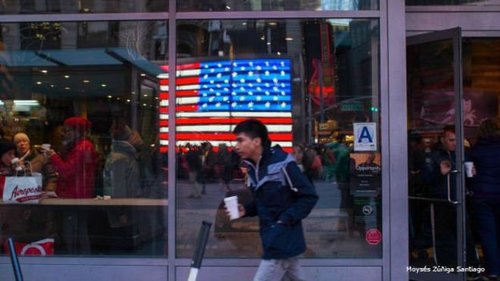
By Allan Wall
04/26/2016
Guess what? Dubya’s notorious Hispandering 2000 nomination convention featured a singer who was not only a Mexican citizen but turns out to be an extreme Trump-phobe. Figures.

VICENTE FERNANDEZ’s Anti-Trump Rant: “I’ll Spit In His Face, I’ll Mention His Mother”
The famous Mexican singer Vicente Fernandez (right) just had his “farewell concert” on April 16th in the massive Estadio Azteca in Mexico City. Besides the music and the memories, “Chente” included an anti-Trump rant in the performance:
The singer Vicente Fernandez had some words in the concert… for….Donald Trump….the artist interrupted his series of songs to express his opinion of “a candidate” who aspires to the presidency of the United States. He didn’t make direct reference to Trump’s name, but it wasn’t necessary, the simple insinuation was more than sufficient for the assembled public to begin a prolonged booing.“The day I find him”, guaranteed Fernandez….” I am going to spit in his face, I’m going to mention his mother.” And he added that he was going to say “everything that they haven’t said [to him]” in his [Trump’s] life.
‘Chente’ escupiría y le ‘mentaría la madre’ a Donald Trump, Excelsior, April 17, 2016

Thus one of Mexico’s most famous singers ends his career by bashing Donald Trump.
Amazing coincidence: back in the year 2000, the year of Dubya’s nomination, a younger Vicente Fernandez (right) performed at the Republican National Convention. [Vicente Fernandez over the years, by Melissa Brown, My San Antonio, undated]
Fitting, isn’t it?
MEXICO’S NEW AMBASSADOR AND HIS PLAN FOR THE UNITED STATES
Mexico’s leaders are so rattled over Donald J. Trump they have replaced Mexican ambassador Miguel Basanez with Carlos Sada, who will presumably deal with the Trump Threat more forcefully. Though Basanez oversaw the strategy of getting Mexican immigrants naturalized as U.S. citizens so they can vote against Trump, that wasn’t enough.
Carlos Sada (needless to say a white Mexican) already has plenty of experience, having served as Consul General in the Mexican consulates of San Antonio, Chicago, New York and Los Angeles. Sada also served a stint at the Mexican embassy in Washington, D.C., where he dealt with Congress.
Excelsior reported (my translations):
The task entrusted to the new ambassador by the senators was to defend the interests of Mexicans living in the United States before the overtones of intolerance and strengthen the image of our country…[Senado aprueba a Sada Solana como embajador en EU,by Hector Figueroa Alcantara, April 21, 2016]
And the new Mexican ambassador has a plan for us:
…a response of the Mexican government to the xenophobic expressions and the exacerbation of a negative image of Mexicans in the United States, thus to correct the absence of a systematic project to counter them.
The new ambassador plans to be more (!) aggressive than the outgoing one. He says:
…among various sectors of the United States there is a negative perception of Mexico, which has been exacerbated in the context of the current electoral process in that country.Sadly, we have been witnesses of voices that, taking advantage of a sector of the electorate uninformed of and worried about the challenges presented by globalization……they [these voices] distort the nature and importance of the bilateral relationship and minimize the contributions that Mexican migrants make to the U.S. economy and society.
[Sada planea cambio en relación con EU, by Leticia Robles Rosa, Excelsior, April 21, 2016]
In other words, Mexico believes it should have veto power over American voters who want to get control of our border.
Ambassador Sada has an eight-point plan to keep us in line (“to achieve legal security for the 35 million Mexicans [n.b. including U.S. born-Mexican-Americans] who reside in the United States”):
The 8 Point Sada Plan:
The Sada Plan is just more Mexican meddling and a continuing effort to use Mexican-Americans as a subversive force within our country.
Will any of our politicians complain about this? Is this our election, or Mexico’s?
MEGA MAY DAY MARCH PLANNED

Remember the heady days of the Dubya Administration, when masses of illegal aliens demonstrated in American streets?
Well, a new one is planned for May Day in Los Angeles, partly in commemoration of the marches ten years ago and partly to bash Donald Trump. The plan is to carry a banner at the front of the parade reading Construyamos puentes, no muros. Alto a Donald Trump [“Let us construct bridges, not walls. Stop Donald Trump”]. [Marcharán este Primero de Mayo contra el odio racial en Los Ángeles, By Isaías Alvarado, La Opinion, April 5, 2016]
“PUEBLAYORK “
Most Mexican immigrants to the United States aren’t pioneers. They usually migrate to American communities already filled with other Mexicans, usually Mexicans from their own city or region. As a result, certain “Mexican” colonies in the United States are really colonies of particular Mexican localities.

Most of the Mexicans in New York City are from the state of Puebla. In honor of them, the BBC’S Spanish-language outlet BBC Mundo (that’s Spanish for “world”), just ran a piece entitled "Pueblayork": la ciudad "secreta" de mexicanos que sostiene a Nueva York, [“’Pueblayork’”: the ‘secret’ city of Mexicans that sustains New York”]:
In a business carnitas of pork tacos are sold. A few steps away is a store that offers dresses for girls who turn 15, and after that a restaurant where the daily menu is verdolagas in green sauce, potato quesadillas and lamb mixiotes, a lamb stew that is prepared steamed.The signs in the businesses, the vendors’ offers and the conversations that are heard are in Spanish. It seems like any street in any city of Mexico. But it isn’t.
This is Roosevelt Avenue, the principal street of the Elmhurst neighborhood of Queens, in New York.
For decades the neighborhood has been one of the refuges for Mexicans who enter the United States without documents. [Sic — did they forget their passports?]
Many of the neighborhood are from Puebla, the state that contributes the most migrants to the city. In fact, they were the first Mexicans to arrive to this city, says Joel Magallan, founder of the Tepeyac Association of New York.
[by Alberto Najar, April 19, 2016]
BBC’s Najar reports that “Over a million poblanos live in the United States, the majority in New York neighborhoods.” In fact, he claims that one-sixth of the inhabitants of Puebla now live in New York. That has led to the Big Apple being referred to in Mexico as “Pueblayork”.
Mexicans have a highly inflated sense of their contributions in the United States, and the article reports that “the migrants believe that without their work the city would be a chaos.”
Really?
The aforementioned Tepeyac association has its own office in Manhattan, from which the group has, among other things, organized anti-deportation protests. The organization also has classes for DACA recipients.
Needless to say, Donald Trump comes up. One Carlos Juarez Hernandez, a Puebla native and 20-year old DACA beneficiary, declares:
I am not afraid, but sometimes it makes me angry. I speak with the Mexicans who were born here [Once again, this means U.S. born-Mexican-Americans] and I tell them, go vote, we need the Latino vote because, if not, that Trump will take everything.
VOTING IN MEXICO FROM U.S .
Last year I reported that Mexico has come out with a new type of Voter ID for Mexicans in the U.S., so they can vote in Mexican elections from here.
Now that plan is being executed. La Opinion reported Llegan las credenciales para votar en México desde Estados Unidos, [“The Credentials Arrive to Vote in Mexico From the United States,” by Isaías Alvarado, La Opinion, April 5, 2016].
At the Los Angeles consulate, nearly 5,000 Mexicans had requested such IDs. Nationwide, about half a million are to be distributed, with many more in the future.
La Opinion includes a toll-free number so readers can contact the consulate to get their Mexican IDs. They need a birth certificate, photo ID and proof of residence. (Nothing about proof of legal residence in the U.S. of course).
There’s a larger strategy here. Mexico is trying to facilitate dual citizenship so Mexicans can continue to receive benefits from the American government while still remaining a part of the Mexican nation. And it’s working.
American citizen Allan Wall moved back to the U.S.A. in 2008after many years residing in Mexico. Allan’s wife is Mexican, and their two sons are bilingual. In 2005, Allan served a tour of duty in Iraq with the Texas Army National Guard. His VDARE.COM articles are archived here; his Mexidata.info articles are archived here; his News With Views columns are archived here; and his website is here.
This is a content archive of VDARE.com, which Letitia James forced off of the Internet using lawfare.